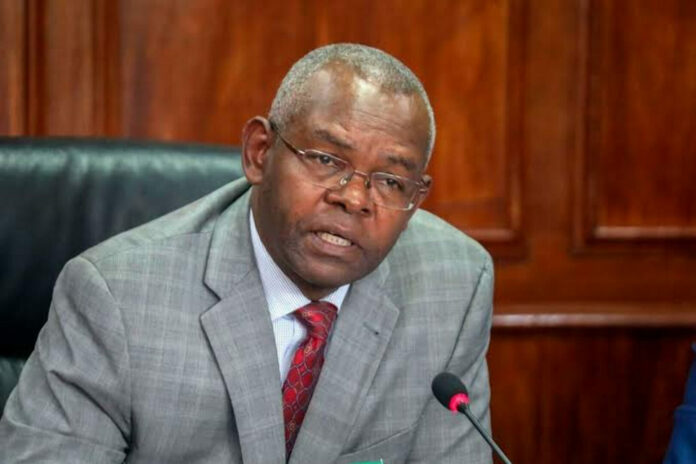Central Bank of Kenya Governor Kamau Thugge has gone on a rant against former CBK Governor Patrick Njoroge accusing over Kenya’s weak shilling.
Thugge has alleged that Njoroge used USD2.8 billion to artificially maintain the Kenya shilling between year 2020 and 2023. This is the latest episode in what has become a pattern of the current administration blaming the previous administration for non-working policies.
Notably, the shilling has fallen from around 119 as at August 2022 to the curry lows of 153 and commercially between 158 and 160 against the US dollar.
Thugge has further claimed that the shilling has depreciated more than is required.
“The exchange rate has depreciated more than is required to establish an equilibrium and market determined stable and competitive rate. Where we are now is a situation where there is a lot of uncertainty and foreign investors are hesitant about coming in because they are not sure on where the exchange rate will settle,” said Thugge.
In an interview done in October 2023, Thugge had alleged that that the shilling was overvalued for six years under the presidency of retired President Uhuru Kenyatta. He alleged that it dawned on the government of current president William Ruto that the shilling was overvalued after taking power.
The Governor said that the International Monetary Fund (IMF) and the World Bank had said that the shilling was being manipulated to stay strong by the government of former president Uhuru.
Ironically, when he appeared before a parliamentary committee to be vetted for the position of Governor, Thugge had claimed that the shilling was getting weak because of people who were hoarding dollars.
He said that upon occupying the office of Governor, he would seek to issue a dollar-dominated bond.
“One of the things that I would like to explore with the National Treasury is the possibility of actually issuing a dollar-denominated bond, the way we issue an infrastructure bond, and we structure it and sell it locally,” Thugge had said.
“If we can get those Kenyans who are holding dollars in their deposits to buy into it… we will have a possibility of actually increasing the liquidity of dollars in the system but also building up foreign exchange in the Central Bank.”
His suggestion was rubbished by Njoroge who said that it would do more harm than good.
“A local dollar-denominated bond issuance would not mop up any excess dollars as there are none. The bond would only be beneficial to the extent that it would attract new dollars from the rest of the world. We (however already) do this when we issue a Eurobond which is bought mainly by non-resident investors,” said Dr. Njoroge.
Be very worried if you have a bank loan as CBK loan rate hits record high
“It is very hard to think of how the government would mop up small deposits from retail investors, say with Sh. 1,000 each through a foreign currency issued bond. This would also end up fanning the flames of dollarisation in the economy and you can think of the effect this has had in other economies.”
In a recent media interview at Spice FM, National Treasury Cabinet Secretary Njuguna Ndung’u had claimed that the ongoing currency depreciation was an act of the shilling finding its true value.
The cabinet secretary further denied that the shilling is on a free fall. “I have seen some papers say a free fall exchange rate is bad as the currency is depreciating. No, it is not bad for the currency to depreciate, it is adjusting to its true value,” CS Njuguna Ndung’u had said.
“The exchange rate is market determined. It has to reflect the scarcity or abundance of what is market. It is following reality because it was for a long time held and not allowed to adjust,” he said. “You cannot have a free fall. The exchange rate is a relative price. It’s a ratio of one price to another price.”
The current currency depreciation is estimated to be adding up to Sh. 65 billion per month to Kenya’s debt. A report by the Parliamentary Budget Office shows that the weakening of the shilling added Sh. 809 billion to the public debt in the 12 months starting July 2022.








